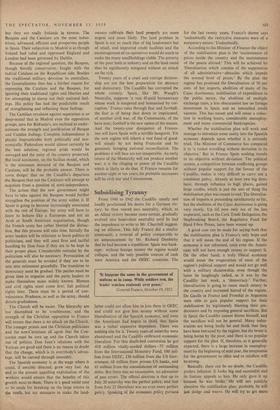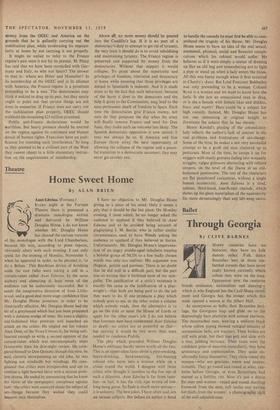Subsidising Tyranny
From 1940 to 1942 the Caudillo openly and loudly proclaimed his desire for a German vic- tory; he then veered into neutrality, which, as an Allied victory became more certain, gradually evolved into benevolent neutrality until he had the impudence to write to Mr. Churchill suggest- ing an alliance. This July Franco did a similar somersault, a reversal of policy comparable to an announcement by Mr. Richard Dimbleby that he had become a republican. Spain was bank- rupt: without foreign money the regime would collapse, and the only possible sources of cash were America and the OEEC countries. The 'It happens the same in the government of nations as in camp. While soldiers rest, the leader watches zealously over peace.' General Franco, October 19, 1952.
latter could not allow him to join them in OEEC and could not give him money without some liberalisation of the Spanish economy, and even the Americans had begun to think that Spain was a rather expensive dependant. There was nothing else for it. Twenty years of autarchy were abandoned and the Caudillo embraced economic liberalism. For this death-bed conversion he got 418 million vitally-needed dollars-75 million from the International Monetary Fund, 100 mil- lion from OEEC, 130 million from the US Gov- ernment, 68 million from private US banks, and 45 million from the consolidation of outstanding debts. But there was no recantation, no admission of past errors. The official doctrine is that up to July 20 autarchy was the perfect policy, and that from July 21 liberalism was an even more perfect policy. Speaking of the economic policy pursued for the last twenty years, Franco's decree says 'undoubtedly the restrictive measures were of a temporary nature.' Undoubtedly.
According to the Minister of Finance the object of the stabilisation plan is the 'maintenance of prices inside the country and the maintenance of the peseta abroad.' This will be achieved by 'liberalisation which consists of the suppression of all administrative • obstacles which impede the normal level of prices.' By the plan the regime has promised the liberalisation of 50 per cent, of her imports, abolition of many of the Goias Antotiontas, stabilisation of expenditure in the public sector, the abolition of multiple exchange rates, a less obscurantist law on foreign investment in Spain and an intensified credit squeeze. This has meant and will mean a reduc- tion in working hours, considerable unemploy- ment and many commercial bankruptcies.
Whether the stabilisation plan will work and manage to introduce some sanity into the Spanish economy depends upon whether it is seriously tried. The Minister of Commerce has compared it to 'a rocket travelling without deviation to its objective.' But in Franco Spain nothing travels to its objective without deviation. The political system, a competition between conflicting groups without popular support for the favour of the Caudillo, makes it very difficult to carry out a consistent policy. Already at least two big firms have, through influence in high places, gained large credits, which is just the sort of thing the stabilisation plan was meant to end. The liberalisa- tion of imports is proceeding satisfactorily so far, but the abolition of the Ca/as Auttinottuts is going very slowly. Up till now only ten of the less important, such as the Cork Trade Delegation, the Shipbreaking Board, the Regulative Fund for Hard Fibre Prices, have been wound up.
A good case can be made for saying both that the stabilisation plan is Franco's only hope and that it will mean the end of his regime. I the economy is not reformed, soon even the Ameri- cans will not have enough money to support it.
On the other hand, a truly liberal economy would mean the evaporation of most of the regime's political support and would not go well
with a military dictatorship, even though the latter be laughingly called, as it was by the Caudillo last week, a 'democracy.," Further, liberalisation is going to cause much misery in
the country and increased hatred of the regime. De Gaulle in France and Frondizi in Argentina were able to gain popular support for their stabilisation by legitimately blaming their pre- decessors and by imposing general sacrifices. But in Spain the Caudillo cannot blame himself, and the sacrifices will not be general. Many indus- trialists are being badly hit and think that they have been betrayed by the regime, but the brunt is being borne by the poor, and there is no popular support for the plan. If, therefore, as is generally expected, there is a large increase in unemploy- ment by the beginning of next year, the temptation for the government to relax and to reinflate will be strong.
Basically, there can be no doubt, the Caudillo prefers inflation. It looks big and successful and its fantasy appeals to him. He only gave it up because he was broke. He will not publicly abandon the stabilisation plan; probably he will just dodge and weave. He will try to get more money from the OEEC and America on the grounds that he is gallantly carrying out the stabilisation plan, while moderating his unpopu- larity at home by not carrying it out properly.
It might be unfair to refer to the Franco regime's past were it not for its present. M. Pinay has said that we have been reconciled with Ger- many and Italy, so why not Spain? The answer to that is: where are Hitler and Mussolini? In its membership of the OEEC and in its alliance with America, the Franco regime is a prostitute pretending to be a nun. The democracies may think it unkind to drag up its past, but they surely ought to point out that certain things are not done in nunneries. If Franco does not carry out the stabilisation plan properly, OEEC should withhold the remaining $25 million promised.
Public anti-Franco declarations would be worthless. But heavy pressure should be exerted on the regime against its continued and blatant denial of human rights. Francoists have no justi- fication for resenting such Interference.' So long as they pretend to be a civilised part of the West they cannot object to a little elementary instruc- tion on the requirements of membership. Above ail, no more money should be poured into the Caudillo's lap. If it is no part of a democracy's duty to attempt to get rid of tyranny, the very least it should do is to avoid subsidising and maintaining tyranny. The Franco regiine is preserved and supported by money from the democracies. Without that support it would collapse. To prate about the superiority and privileges of freedom, toleration and democracy at home while ensuring that those privileges are denied to Spaniards is indecent. And it is made more so by the fact that such behaviour, because of the harm it does to the democrats and the help it gives to the Communists, may lead to the near-permanent death of freedom in Spain. Each time the democracies give Franco money, not only do they postpone the day when the army will finally remove Franco and send for Don Juan, they make such an outcome less likely. The Spanish democratic opposition is now united; it may not always be so. If America and free Europe throw away the next opportunity of allowing the collapse of the regime and a peace- ful transition to a democratic successor, they may never get another one.











































 Previous page
Previous page